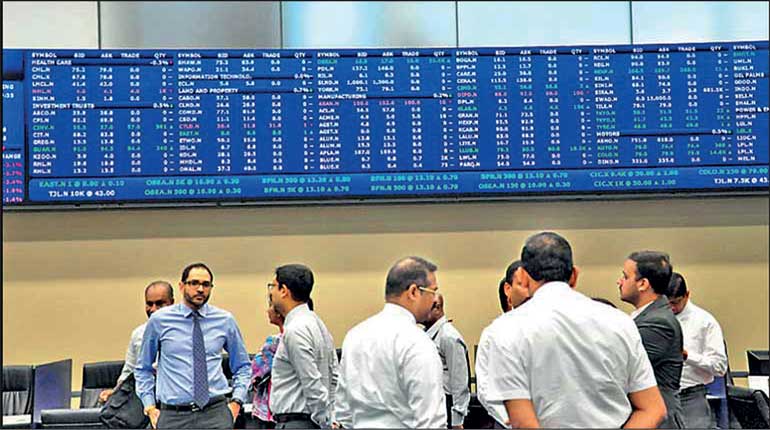Friday Feb 20, 2026
Friday Feb 20, 2026
Thursday, 12 December 2024 00:22 - - {{hitsCtrl.values.hits}}

While investing in the share market carries risk, there are clear long-term rewards for those who enter it with discipline
 Sri Lanka’s equity market as measured by the Colombo Stock Exchange is hitting new highs, in a wave of political and economic optimism. Buoyed by expectations of stronger than expected economic growth and fuelled by lower interest rates, the benchmark stock market index the ASPI (All Share Price Index) sparkles this December like a Christmas ornament. Market liquidity which appears on the way up and hopes of capital gains tempt individual investors to increase their risk tolerance and test the market’s waters. Despite Sri Lankan investors’ usual intolerance of investments without the assurance of expected future cash flows, the stock market beckons.
Sri Lanka’s equity market as measured by the Colombo Stock Exchange is hitting new highs, in a wave of political and economic optimism. Buoyed by expectations of stronger than expected economic growth and fuelled by lower interest rates, the benchmark stock market index the ASPI (All Share Price Index) sparkles this December like a Christmas ornament. Market liquidity which appears on the way up and hopes of capital gains tempt individual investors to increase their risk tolerance and test the market’s waters. Despite Sri Lankan investors’ usual intolerance of investments without the assurance of expected future cash flows, the stock market beckons.
Why invest in the share market?
Asian investors, particularly those in Hong Kong and Singapore, are documented to display high risk tolerance. These investors are comfortable investing a large proportion of their portfolios in shares. Research studies show a link between the high preference for gambling with these individuals and their tradeoff decision across investing in lotteries and the stock market. But apart from the casino-like excitement offered by the stock market, let’s re-examine this basic question: why invest in the stock market?
The American economist Harry Markowitz (1927-2023) proposed the theory of selecting investments to maximise overall return, subject to a particular level of risk. This is known as Modern Portfolio Theory, for which Markowitz later won the Nobel Prize. In short, this theory advocates to build a portfolio of investments that maximise expected return, for a given level of risk. A key step in this process is diversification.
Not having all your eggs in one basket
Diversification means not having all your eggs in one basket. Many investments display characteristics of having low risk and low returns, or high risk and high returns – which makes sense logically. However, Markowitz argued that combining the two types would provide an optimal mix that would result in lower risk and superior investment outcomes overall. He also indirectly proposes that we take a portfolio view of investments, not evaluate each in isolation.
How do we diversify in the real world outside investment theory? We invest in different types of investment securities somewhat unconnected or correlated to each other: each having different investment cycles, risk and returns. For example, across 1) cash, treasury bills and investments that can easily be converted into cash, 2) those assuring a predictable stream of cash flows such as fixed deposits, treasury bonds or corporate debentures (“fixed income securities”), 3) those offering an unpredictable return such as shares and real estate. The idea of the benefits of diversification is long established and time tested. It was first proposed in the Babylonian Talmud, dating back to around 300 BCE.
So the short answer to why invest in the share market: investing in listed shares provides everyday investors with important diversification, which in turn permits them to build better portfolios. Adding exposure to shares listed on the Colombo Stock Exchange allows investors presently only invested in cash or fixed income securities to improve the level of return of their investment portfolio without increasing their portfolio risk. How? By giving them access to a new investment which moves in a different cycle to those they presently hold.
What this means in real life term is, suppose interest rates are moving downwards. Investors find as their investments mature, that they are required to reinvest at rates lower than they were used to. They may be concerned as to how to meet their investment goals in a low interest rate environment. They may feel that their investment options are limited. However, in contrast, the share market offers an inverse relationship between interest rates and performance. When interest rates move downwards, this is positive for the market, as it provides an opportunity for the companies listed on the stock exchange to borrow at lower cost (at lower interest rates) and therefore to invest for future growth. This investment and the resulting future growth is then reflected in share prices and investors are able to benefit from that price appreciation.
Why should ordinary investors be interested?
So why should ordinary investors be interested in the recent movements of the share market? Here are six good reasons: most importantly portfolio diversification which brings lowering of their portfolio risk levels. The opportunity for growth potential. As the economy grows, companies listed on the stock exchange allow investors to participate in the growth of the economy. Capital gains (growth in the share price) and dividend income. Liquidity. Many shares can be bought and sold at low cost in order to convert them back to cash. However, bear in mind that investments in shares should NOT be considered for a short-term investment. Inflation hedge. As successful listed companies work strive to be profit making, their share prices will reflect adjustments made to their products and internal operations to account for the cost of inflation. Tax advantages. Investing in a listed business is recognised as a higher risk activity where investors take on a role as a partial owner of the company. For doing so, they are rewarded for sharing in the business risk of the company, with more favourable tax treatment. They are also paid dividends out of earnings that have already been taxed.
In conclusion, while investing in the share market carries risk, there are clear long-term rewards for those who enter it with discipline and a clear understanding of why they are getting in – not for Christmases present but for Christmases future.
(The writer is a discretionary wealth management professional and CEO at JB Financial, which operates the awarding winning JB Vantage Value Equity Fund.)